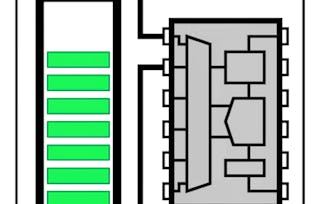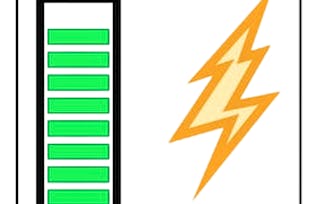Battery comparison, Manufacturing, and Packaging: In this course, you’ll identify components of battery management systems including electrical and thermal protections, cell balancing, state of charge and state of health estimation.

Battery Comparison, Manufacturing, and Packaging
5 days left! Gain next-level skills with Coursera Plus for $199 (regularly $399). Save now.

Battery Comparison, Manufacturing, and Packaging
This course is part of Battery Technologies Specialization

Instructor: Arunachala Nadar Mada Kannan
4,535 already enrolled
Included with
(24 reviews)
Recommended experience
What you'll learn
Participants will learn components of battery management systems, cell balancing, state of charge and state of health estimation.
Skills you'll gain
Details to know

Add to your LinkedIn profile
See how employees at top companies are mastering in-demand skills

Build your subject-matter expertise
- Learn new concepts from industry experts
- Gain a foundational understanding of a subject or tool
- Develop job-relevant skills with hands-on projects
- Earn a shareable career certificate

There are 4 modules in this course
What's included
1 video2 readings
Module 1 provides the basic operating principles of electric vehicle batteries namely, Pb-Acid, Ni-MH and Li-ion. The major objective in this module is to learn about the comparison related to performance, durability and safety of these batteries in the electric vehicle applications. This module also highlights the suitability and requirements of the Pb-Acid, Ni-MH and Li-ion batteries for the electric vehicle applications.
What's included
10 videos1 assignment1 discussion prompt
Module 2 provides the basic concepts of electric vehicle batteries manufacturing. The major objective in this module is to learn about the advanced manufacturing 4.0 of EV batteries with optimized cost of quality using sustainable functional and non-functional materials. This module also provides manufacturing aspects of cylindrical, pouch and prismatic cells, modules and packs for electric vehicle applications.
What's included
14 videos1 assignment
Module 3 provides the basic principles of packaging for optimizing the functional materials through cylindrical, pouch and prismatic configurations. The major objective is to learn about various packaging designs for improving performance, cycle life and safety of the batteries in the electric vehicle applications. This module also provides details on the demand and supply of batteries for EVs.
What's included
13 videos1 reading1 assignment1 peer review
Earn a career certificate
Add this credential to your LinkedIn profile, resume, or CV. Share it on social media and in your performance review.
Instructor

Offered by
Explore more from Electrical Engineering
 Status: Free Trial
Status: Free TrialUniversity of Colorado Boulder
 Status: Free Trial
Status: Free Trial Status: Free Trial
Status: Free TrialArizona State University
 Status: Free Trial
Status: Free TrialUniversity of Colorado Boulder
Why people choose Coursera for their career

Felipe M.

Jennifer J.

Larry W.

Chaitanya A.

Open new doors with Coursera Plus
Unlimited access to 10,000+ world-class courses, hands-on projects, and job-ready certificate programs - all included in your subscription
Advance your career with an online degree
Earn a degree from world-class universities - 100% online
Join over 3,400 global companies that choose Coursera for Business
Upskill your employees to excel in the digital economy
Frequently asked questions
To access the course materials, assignments and to earn a Certificate, you will need to purchase the Certificate experience when you enroll in a course. You can try a Free Trial instead, or apply for Financial Aid. The course may offer 'Full Course, No Certificate' instead. This option lets you see all course materials, submit required assessments, and get a final grade. This also means that you will not be able to purchase a Certificate experience.
When you enroll in the course, you get access to all of the courses in the Specialization, and you earn a certificate when you complete the work. Your electronic Certificate will be added to your Accomplishments page - from there, you can print your Certificate or add it to your LinkedIn profile.
Yes. In select learning programs, you can apply for financial aid or a scholarship if you can’t afford the enrollment fee. If fin aid or scholarship is available for your learning program selection, you’ll find a link to apply on the description page.
More questions
Financial aid available,
¹ Some assignments in this course are AI-graded. For these assignments, your data will be used in accordance with Coursera's Privacy Notice.

